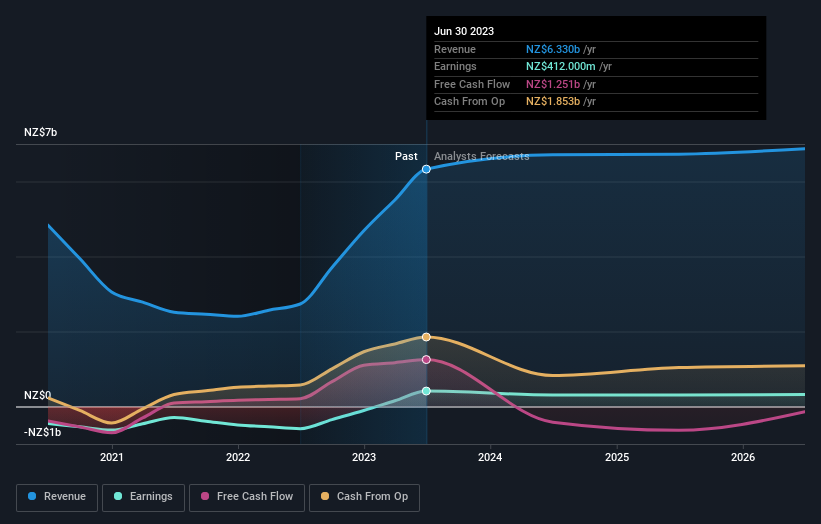Stock Analysis
- New Zealand
- /
- Airlines
- /
- NZSE:AIR
Air New Zealand (NZSE:AIR) sheds NZ$101m, company earnings and investor returns have been trending downwards for past five years

Generally speaking long term investing is the way to go. But no-one is immune from buying too high. Zooming in on an example, the Air New Zealand Limited (NZSE:AIR) share price dropped 78% in the last half decade. That's an unpleasant experience for long term holders. Shareholders have had an even rougher run lately, with the share price down 17% in the last 90 days. Of course, this share price action may well have been influenced by the 10% decline in the broader market, throughout the period.
Given the past week has been tough on shareholders, let's investigate the fundamentals and see what we can learn.
View our latest analysis for Air New Zealand
In his essay The Superinvestors of Graham-and-Doddsville Warren Buffett described how share prices do not always rationally reflect the value of a business. By comparing earnings per share (EPS) and share price changes over time, we can get a feel for how investor attitudes to a company have morphed over time.
During five years of share price growth, Air New Zealand moved from a loss to profitability. That would generally be considered a positive, so we are surprised to see the share price is down. Other metrics may better explain the share price move.
Arguably, the revenue drop of 9.1% a year for half a decade suggests that the company can't grow in the long term. That could explain the weak share price.
The company's revenue and earnings (over time) are depicted in the image below (click to see the exact numbers).

We consider it positive that insiders have made significant purchases in the last year. Having said that, most people consider earnings and revenue growth trends to be a more meaningful guide to the business. This free report showing analyst forecasts should help you form a view on Air New Zealand
What About The Total Shareholder Return (TSR)?
We'd be remiss not to mention the difference between Air New Zealand's total shareholder return (TSR) and its share price return. The TSR attempts to capture the value of dividends (as if they were reinvested) as well as any spin-offs or discounted capital raisings offered to shareholders. Dividends have been really beneficial for Air New Zealand shareholders, and that cash payout explains why its total shareholder loss of 56%, over the last 5 years, isn't as bad as the share price return.
A Different Perspective
We regret to report that Air New Zealand shareholders are down 7.6% for the year. Unfortunately, that's worse than the broader market decline of 1.6%. Having said that, it's inevitable that some stocks will be oversold in a falling market. The key is to keep your eyes on the fundamental developments. Unfortunately, longer term shareholders are suffering worse, given the loss of 9% doled out over the last five years. We'd need to see some sustained improvements in the key metrics before we could muster much enthusiasm. It's always interesting to track share price performance over the longer term. But to understand Air New Zealand better, we need to consider many other factors. Case in point: We've spotted 1 warning sign for Air New Zealand you should be aware of.
Air New Zealand is not the only stock insiders are buying. So take a peek at this free list of growing companies with insider buying.
Please note, the market returns quoted in this article reflect the market weighted average returns of stocks that currently trade on New Zealander exchanges.
Valuation is complex, but we're helping make it simple.
Find out whether Air New Zealand is potentially over or undervalued by checking out our comprehensive analysis, which includes fair value estimates, risks and warnings, dividends, insider transactions and financial health.
View the Free AnalysisHave feedback on this article? Concerned about the content? Get in touch with us directly. Alternatively, email editorial-team (at) simplywallst.com.
This article by Simply Wall St is general in nature. We provide commentary based on historical data and analyst forecasts only using an unbiased methodology and our articles are not intended to be financial advice. It does not constitute a recommendation to buy or sell any stock, and does not take account of your objectives, or your financial situation. We aim to bring you long-term focused analysis driven by fundamental data. Note that our analysis may not factor in the latest price-sensitive company announcements or qualitative material. Simply Wall St has no position in any stocks mentioned.
About NZSE:AIR
Air New Zealand
Provides passenger and cargo transportation services on scheduled airlines primarily in New Zealand, Australia, the Pacific Islands, the United Kingdom, Europe, Asia, and the United States.
Undervalued with adequate balance sheet and pays a dividend.

